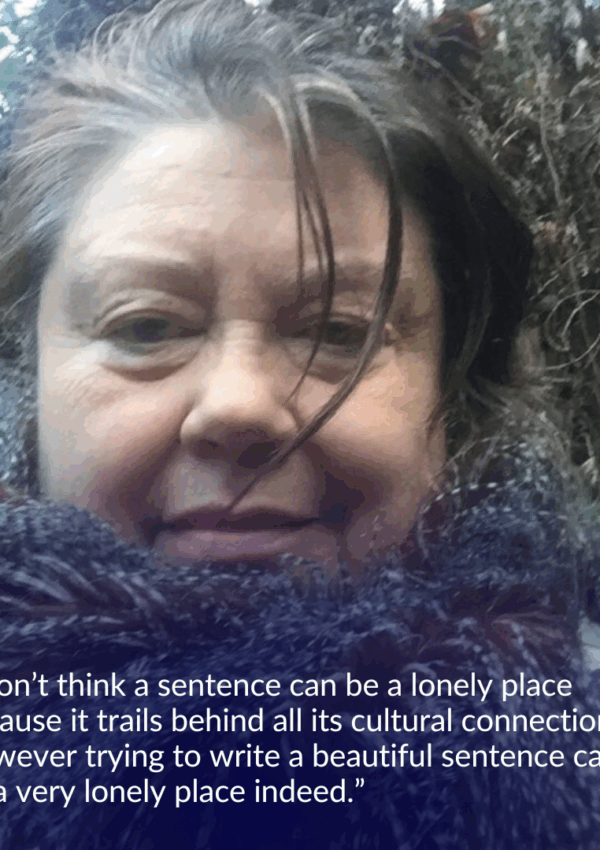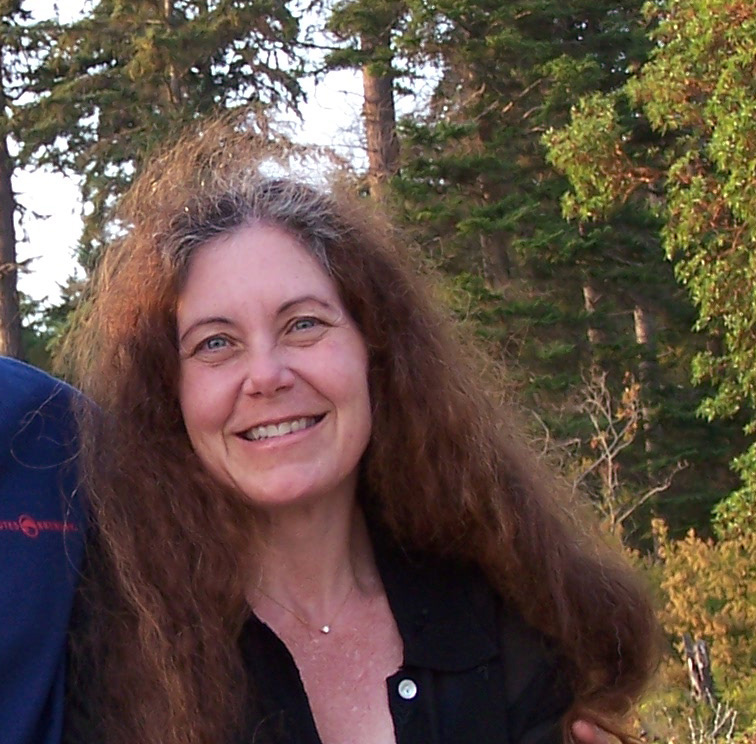I’ve always had trouble stepping back and seeing the big picture.
“Well, no wonder you’re struggling,” my tenth-grade U.S. History teacher said when we met about my failing grade. “You’ve underlined every single sentence in this textbook. You don’t know how to distinguish main ideas from supporting details.”
My eyes burned with tears. “But I feel like they’re all important,” I whispered, my heart sagging with the notion that not all Ben Franklin witticisms were created equal.
This is the way I write, with my nose and my vision pressed close to the page. Such short-sightedness makes producing every word painful. I don’t let a sentence breathe on its own until I’ve poked and plucked and plumped it. Then, I’ll write another sentence or two, and find myself hovering back over the first one. A paragraph might take me hours. I am not a prolific writer; I do not get up at four in the morning or go on retreats. I refuse to scribble scenes on sticky notes so that I can rearrange them until my plot structure emerges. I roll my eyes at rituals: standing on my head, copying passages from David Sedaris, eating and purging pages of my own literary excrement. By all clichés, I am not a writer, spouting geysers of pure prodigy when inspiration hits. Much of the writing I do springs from innate talent and passion; much of it is learned, adopted, adapted, and produced by trial-and-error. But all of it is effing hard.
First, from a big-picture vantage point, I must say that my decision to attend Emerson’s MFA program stands as one of the best I’ve ever made. However, graduate workshops in which classmates and professors scrutinized my stories left me recoiling in corners, shrunken and demoralized. My classmates and I not only marked up each other’s manuscripts with meticulous commentary, but we also wrote each other single-spaced letters about which story elements we felt both worked and didn’t work. In class, each writer would stay “inside the box,” forbidden to speak, during a 45-minute session in which fourteen peers and the instructor deconstructed his or her story or chapter. Soon I discovered that downing a glass of wine at Rock Bottom before a workshop could be a life-saving measure.
A course in The Contemporary Novel granted me a particularly humiliating experience when we had to write imitative “inserts” in the voice and style of an author we were reading. I studied the narrative rhythms of Lolita’s Humbert Humbert, the quirks of his endearments and the lascivious timbre of his gestures. I was hooked by the end, having a blast with creepy dialogue laden with double-entendre. Turns out, I shouldn’t have given myself so much credit. In the workshop, everyone blasted me for my use of non-Nabokov-like punctuation, speakers’ tags, and adverbs…or something like that. The nit-picking dragged on; finally, I escaped to the bathroom and sobbed. What the hell was the value of writing in the voice of an artist we were not, and would never be? I understood the idea of turning to the masters for guidance, but not to the end of distorting or flagellating ourselves as writers. Eight weeks later, when I committed a similar atrocity by mimicking articles and pronouns from Julie Otsuka’s The Buddha in the Attic with devastating inaccuracy, I got really pissed. Pissed that my life beyond this classroom—a husband, two young children, a full-time, grading-intensive job—counted for little as I labored to satisfy a microcosmic exercise that could have been fun, but on the contrary served to weed out the “non-serious” MFA candidates. I lost my grip on my own writing’s worth, and perhaps even my own worth as a human being, in striving to become Nabokov and Otsuka down to the letter.
Upon earning my Creative Writing degree in the spring of 2015, I faced a summer open and ready for serious writing achievement. My children were attending day camp for four weeks. Nothing threatened the impending love affair between me, my laptop, and the first draft of my novel. So, day after day I sat in front of my MacBook Air at the dining room table. Day after day, I didn’t write. I was stricken with a sort of post-MFA-trauma. The fear that I’d choose the wrong word, or that I’d write down too many words, or that my words wouldn’t say anything significant at all, had been spreading through my joints like a virus, stiffening my creative muscles and paralyzing my spirit.
I barely wrote for an entire year.
How could I waste yet another summer? I certainly wasn’t getting any younger, and my entire being longed to put my dream-degree to use. A course entitled Master Novel-in-Progress, offered by Grub Street in Boston, promised to revive my Muse. I had taken two Grub courses prior to my MFA, and so I understood that the climate of the Novel class, one without grades or the looming pressure of a $16K-per-year tuition bill, would most likely be less stressful and more practical than some of the classes I had taken at Emerson. At Grub Street, lawyers, grandmothers, teachers, and baristas would not be writing for instructor approval or a perfect GPA. They would be learning how to be writers in the contexts of their messy, multifaceted, grown-up lives. I hadn’t planned on revealing my neurosis during the first class, but my confession burst from me before I could stop it.
“I’m paralyzed by panic and dread after my MFA program!” I blurted. “I’ll never be able to write a novel—never!”
“We’re here to look at the big picture,” the instructor and novelist Lisa Borders said. “There’s no place for discussions about the details when you’re writing a first draft.”
I was wary of the concept that one could evaluate the success of a piece of writing without harping on the virtues and defects of the language itself. But soon enough, Lisa’s tactics made sense. Instead of bringing home each other’s chapter drafts to mark up, we brought in ten pages during an appointed week, performed a cold reading of the pages, and received on-the-spot feedback. This method allowed no time to call out a writer’s adverb abuse or to question the off-color humor on the bottom of page six. Lisa urged us to articulate what we thought the novel might be about. She led us through a conversation about the clarity of the protagonist’s desires. She invited us to consider exposition placement. “Where is the main tension in these pages?” she asked. For the first time I understood the viability of assessing the holistic instead of the word-by-word integrity of a writing project.
I started to let go of the perfectionist sensibility that I had always indulged. Instead, I paid attention to the causality in my plot, the momentum of the action. I played with the energies between my characters, the positive and negative charges in their dialogue. I imagined where I wanted my protagonist to wind up, emotionally and psychologically, at the end of her journey. (Why couldn’t I see the trajectory of my own journey?) Stepping back and envisioning the full-bodied organism of my novel showed me that it actually existed, that it was alive and making progress, that I had a goal for it and it had a goal for me.
Because I wanted so fiercely to be published and widely-read, and because I believed that the MFA workshop in all its rigor would prepare me for a real writing career, my perspective became stuck behind a limited and limiting lens that eventually fogged up with self-loathing. Lisa Borders and the Novel-in-Progress course rescued me from this provincial delusion and gifted me a panoramic view of the process. With the dawn of a broader outlook re-surged my love for writing, that deep, aching affection that had driven me to enroll at Emerson in the first place; I also began to recognize, and appreciate, just how much the MFA program had taught me about the craft of fiction-writing, even while my ego was suffering. And I was more willing than ever to project my future as a novelist.
I trace my soul-saving transformation back to an instructor who cared about her students’ long-term sustainability in the writing world, and who dared to offer a blasphemous piece of advice in order to secure it: that ditching the details is not only acceptable, but crucial to growth.
Do you hear it, too? The welcoming thrum of circulation in the wide-open creative space around you? That’s your Big Picture, a healing landscape with plenty of room for exploration and revision, generous with forgiveness.
 Elizabeth Mastrangelo first started writing fiction on her mother’s Canon typewriter thirty-six years ago. These days, she teaches English to ninth and tenth graders and also works as a freelancer, ghostwriting nonfiction books, romance novellas, and website copy. Liz holds an MEd and an MA in English from UMass Boston and an MFA in Creative Writing from Emerson College. Living with her devoted husband, spunky daughter, and sports-obsessed son on the north shore of Massachusetts provides her with endless engaging material for her stories. Liz’s work has appeared in Sheepshead Review, Burningword Literary Journal, Bartleby Snopes, and Visitant, amongst other publications. She blogs about teaching, womanhood, and motherhood at her site, www.spurredgirl.com.
Elizabeth Mastrangelo first started writing fiction on her mother’s Canon typewriter thirty-six years ago. These days, she teaches English to ninth and tenth graders and also works as a freelancer, ghostwriting nonfiction books, romance novellas, and website copy. Liz holds an MEd and an MA in English from UMass Boston and an MFA in Creative Writing from Emerson College. Living with her devoted husband, spunky daughter, and sports-obsessed son on the north shore of Massachusetts provides her with endless engaging material for her stories. Liz’s work has appeared in Sheepshead Review, Burningword Literary Journal, Bartleby Snopes, and Visitant, amongst other publications. She blogs about teaching, womanhood, and motherhood at her site, www.spurredgirl.com.
Elizabeth’s work appears in Black Fox Issue 14.




This essay to me is one of your best. I was moved my the passion and insight. This essay is so real and on the moment.you still do love words but so compelling!
Thank you! Yes, I still have to work incredibly hard at streamlining my prose, but it’s good exercise. I am learning every day to express myself more succinctly than I did the day before. And then there are just times when my love affair with words takes over all logic.
“This is the way I write, with my nose…pressed close to the page.” Love this line and also that you found your way out of paralysis by by one terrific teacher, Lisa Borders, and stepping back and keeping your eye on the big picture. Can’t wait to read the finished novel!
Hi, Lisa! I so appreciate your support, especially since you are a model of sharp, bright, funny economic writing. It’s a true talent. I’m still waiting to read your other novel…? Looking forward to being back in class with you again!
This might be my favorite thing you have ever written, Liz. Thanks for sharing it!
Hi, Jay! What an awesome compliment – thank you. Hope you are writing furiously these days, too!